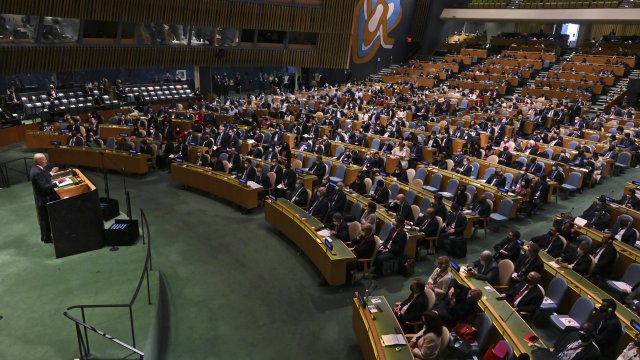President Joe Biden used his first address before the U.N. General Assembly on Tuesday to declare that the world stands at an “inflection point in history” and must move quickly and cooperatively to address the festering issues of the COVID-19 pandemic, climate change and human rights abuse.
Amid growing China tensions President Biden also declared the U.S. is “not seeking a new Cold War.”
Without mentioning China directly, President Biden acknowledged increasing concerns about rising tensions between the two nations. But he said, “We are not seeking a new Cold War or a world divided into rigid blocs,.”
The president noted his decision to end America's longest war last month, in Afghanistan, and set the table for his administration to shift U.S. attention to intensive diplomacy with no shortage of crises facing the globe. He said he is driven by a belief that “to deliver for our own people, we must also engage deeply with the rest of the world.”
“We’ve ended 20 years of conflict in Afghanistan,” President Biden said. “And as we close this period of relentless war, we’re opening a new era of relentless diplomacy of using the power of our development aid to invest in new ways of lifting people up around the world.”
President Biden, who arrived in New York on Monday evening to meet with Secretary General Antonio Guterres ahead of Tuesday's address, offered a full-throated endorsement of the body's relevance and ambition at a difficult moment in history.
The president, in brief remarks at the start of his meeting with Guterres, returned to his mantra that “America is back" — a phrase that's become presidential shorthand meant to encapsulate his promise to take a dramatically different tack with allies than predecessor Donald Trump. In his remarks, he declared the United States was “back at the table.”
“We will lead not just with the example of our power but God willing with the power of our example,” President Biden said Monday night.
But the president was facing a healthy measure of skepticism from allies during his week of high-level diplomacy. The opening months of his presidency have included a series of difficult moments with friendly nations that were expecting greater cooperation from President Biden following four years of Trump's “America first” approach to foreign policy.
Eight months into his presidency, President Biden has been out of sync with allies on the chaotic ending to the U.S. war in Afghanistan. He has faced differences over how to go about sharing coronavirus vaccines with the developing world and over pandemic travel restrictions. And there are questions about the best way to respond to military and economic moves by China.
President Biden also finds himself in the midst of a fresh diplomatic spat with France, the United States' oldest ally, after announcing plans — along with Britain — to equip Australia with nuclear-powered submarines. The move is expected to give Australia improved capabilities to patrol the Pacific amid growing concern about the Chinese military's increasingly aggressive tactics, but it upended a French defense contract worth at least $66 billion to sell diesel-powered submarines to Australia.
French Foreign Minister Jean-Yves Le Drian said Monday there was a “crisis of trust” with the U.S. as a result of the episode.
Before President Biden’s arrival, EU Council President Charles Michel strongly criticized the Biden administration for leaving Europe “out of the game in the Indo-Pacific region” and ignoring the underlying elements of the trans-Atlantic alliance — transparency and loyalty — in the withdrawal from Afghanistan and the announcement of the U.S.-U.K.-Australia alliance.
Despite such differences, President Biden hoped to use his address to the General Assembly as well as a series of one-on-one and larger meetings with world leaders this week to make the case for American leadership on the world stage.
“There are points of disagreement, including when we have disagreed with the decisions other countries are making, the decision points of when countries have disagreed with the decisions we’re making,” White House press secretary Jen Psaki said. “But the larger point here ... is that we are committed to those alliances, and that always requires work from every president, from every global leader.”
Additional reporting by The Associated Press.


